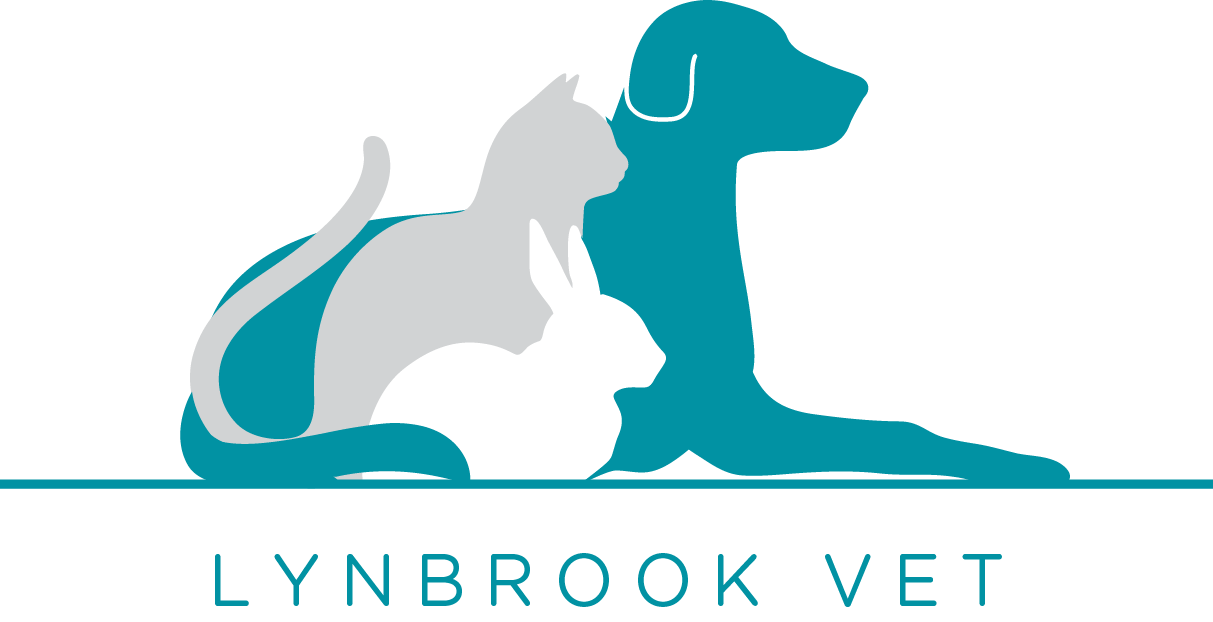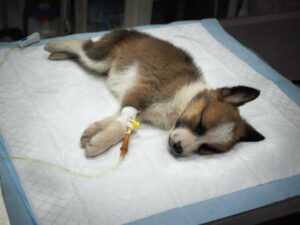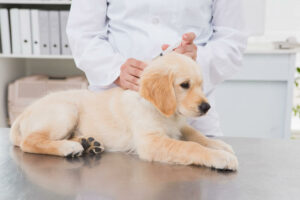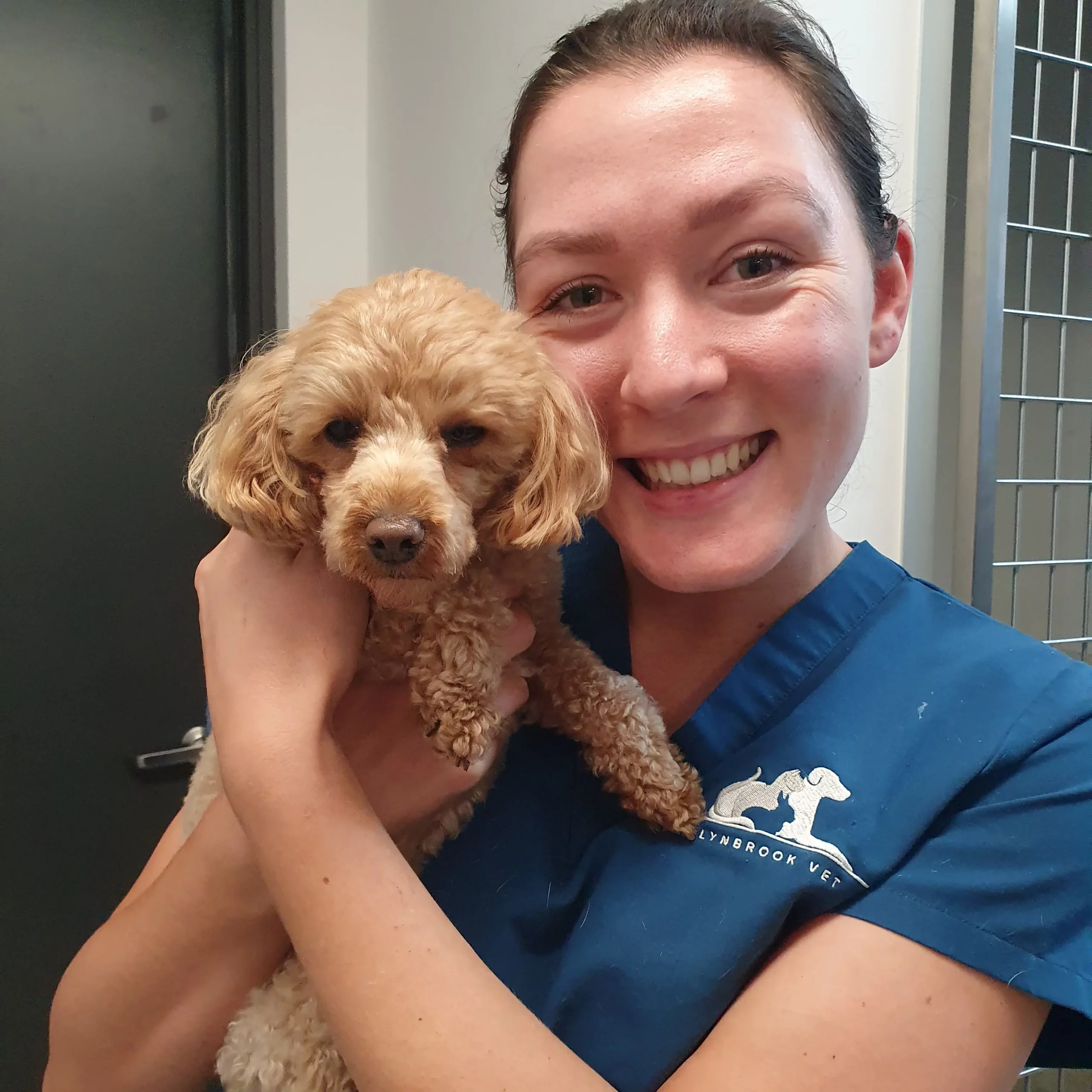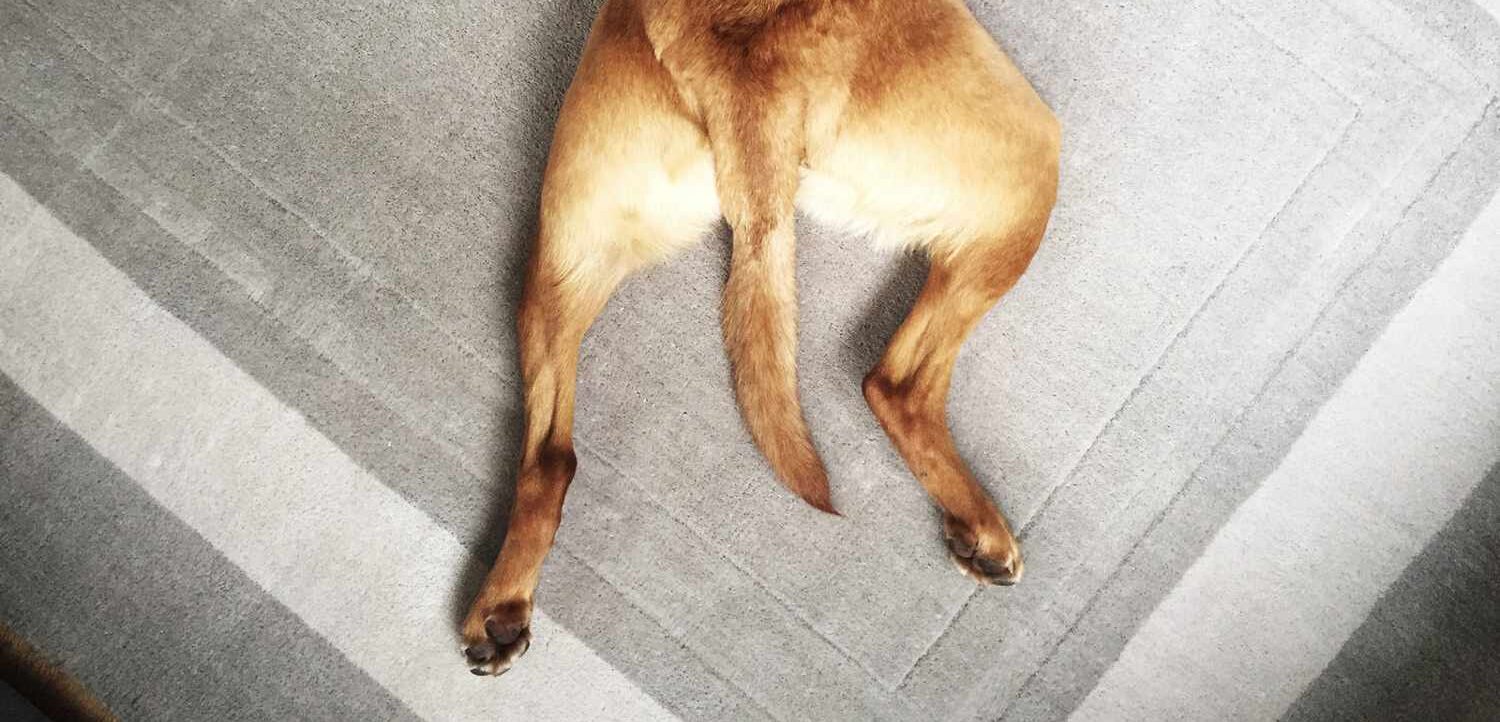Canine parvovirus is a highly contagious virus that can affect all dogs. It is not something you want to mess around with and requires urgent veterinary treatment.
What is Parvovirus?
Parvovirus refers to a group of small, single-stranded DNA viruses that can infect animals.
What animals are most at risk of Parvovirus?
- Unvaccinated dogs
- Puppies younger than four months old
What does Parvovirus do to a dog?
The virus affects dogs’ gastrointestinal tract, attacking cells in the dog’s intestines and stopping them from being able to absorb vital nutrients.
The destruction of the gut lining by parvovirus is so severe that it takes several days for the gut to regain digestive function and water balance. At the same time, the virus also attacks the bone marrow. The damaged bone marrow can no longer produce enough white blood cells needed to fight off infections, and this makes the disease even more serious.
What are the symptoms of Parvovirus?
The main symptoms associated with parvovirus are:
- Lethargy
- Abdominal bloating and pain
- Vomiting
- Diarrhea (which may contain blood)
- Changing body temperature (fever or lower temperature)
- Appetite loss
Persistent vomiting and diarrhea can cause rapid dehydration and damage to the dog’s intestines and immune system. If not treated quickly, this can cause septic shock and death in severe cases.
In some cases, parvovirus in dogs can also affect the heart resulting in inflammation and this is usually fatal.
How is Parvovirus transmitted?
Parvovirus can spread in many ways with the most common being
- direct dog-to-dog contact
- contact with contaminated faeces (stool), environments, or people (for example from the bottom of our shoes).
The virus can also contaminate kennel surfaces, food and water bowls, collars and leashes, and the hands and clothing of people who handle infected dogs.
It is resistant to heat, cold, humidity, and drying, and can survive in the environment for long periods of time. The virus is readily transmitted from place to place on the hair or feet of dogs or via contaminated cages, shoes, or other objects.
This is why it is so important to ensure your pet is vaccinated against parvovirus prior to any boarding or grooming appointments.
How is Parvovirus diagnosed?
Parvovirus is usually diagnosed by a rapid antigen test.
This is the most common and most convenient method of testing which uses a sample of the patient’s faeces. Results are obtained in less than 15 minutes and they’re fairly accurate. On occasion, further testing may be necessary to confirm a diagnosis.
Veterinarians may also rely on a test that uses a technique called polymerase chain reaction (PCR) to diagnose parvovirus from faecal samples.
A faecal PCR test detects small pieces of viral DNA in the stool of an infected dog.
This test is very accurate but requires that a faecal sample be sent to a laboratory that specializes in performing PCR-based testing. However, this means more time and in most parvovirus scenarios, time is of the essence.
A blood test to measure the patient’s white blood cell count is often also run to aid in diagnosis. Bone marrow is one of the first things parvovirus infects and so a low white blood cell count can be suggestive of infection. If time is of the essence, often the positive antigen test & blood test showing a low white blood cell count is enough to make a fairly confident diagnosis of parvovirus and treatment can begin.
How is Parvovirus treated?
Treatment of parvovirus can be pretty tricky.
There are no specific drugs available that will kill the virus in infected dogs, instead, treatment is intended to support the dog’s body system until the dog’s immune system can fight off the viral infection.
Treatment should be started immediately and consists primarily of intensive care efforts to combat dehydration by replacing electrolyte, protein and fluid losses, controlling vomiting and diarrhea, and preventing secondary infection.
Often treatment has a guarded prognosis however, with early recognition and aggressive treatment, survival rates can approach 90%!
Is Parvovirus expensive to treat?
Treatment of parvovirus quickly reaches into the thousands which, when you consider the fact it is easily avoided with the cost of a vaccination at around a hundred dollars, is very expensive!!
Treating a patient with parvovirus involves round-the-clock monitoring, medicating, fluid therapy, patient cleaning, treatment planning and adjustments, all whilst barrier nursing!
Barrier nursing is a technique used to prevent the spread of infectious diseases such as parvovirus from a patient to its caregivers as well as from other animals and the environment.
The use of personal protective equipment (PPE), such as gloves, gowns, masks, and boots are worn by the treating vets and nurses when handling the infected patient.
Barrier nursing for pets involves additional precautions and procedures to prevent the spread of infectious diseases, which can be more time-consuming and resource-intensive for the veterinary clinic. This can include providing dedicated staff, equipment, and facilities to manage the infected animal’s care. The cost of personal protective equipment (PPE) such as gloves, gowns, masks, and boots, which are necessary for barrier nursing, can also be a factor in the increased cost.
It is also important that the infected patient is isolated in a separate room to prevent contact with other animals.
There are additional costs for treating parvovirus (or any infectious disease for that matter) due to the specialized training and expertise required for the veterinary staff to safely and effectively implement barrier nursing procedures as to not spread the disease to other patients.
Parvovirus is not something to mess around with and we don’t take shortcuts when it comes to such a deadly disease. The health and safety of all patients in our care need to be considered.
How can I prevent my dog from getting Parvovirus?
Vaccination and good hygiene are key to parvovirus prevention!
The vaccine works by stimulating the immune system to produce antibodies against parvovirus with vaccination beginning as early as 6 weeks of age!
Puppies generally require 2-3 vaccines (depending on what type they are given) prior to 4 months of age for full immunity against parvovirus.
This means that you should avoid taking your puppy to any high-risk areas until they have been given the all-clear by your vet. High-risk areas include:
- dog parks
- public areas where there will be dogs you don’t know the vaccination status of
- grooming salons
- boarding kennels
Summary
Parvovirus, also known as parvo, is a highly contagious virus that affects dogs, especially puppies and young dogs.
The virus attacks the dog’s gastrointestinal system and can cause symptoms such as vomiting, diarrhea, fever, and lethargy.
The virus is transmitted through contact with infected dogs, faeces, or contaminated environments and can survive in the environment for long periods of time.
The best way to prevent parvo is through vaccination, as there is no specific treatment for the virus. If left untreated, the virus can cause severe dehydration and can be fatal, especially in young puppies or dogs with weakened immune systems.
Talk to an Experienced Vet
If you’d like to speak to an experienced vet about Parvovirus, vaccinations and your perfect pooch, our team is happy to help. Get in touch.
What is Parvovirus?
Parvovirus refers to a group of small, single-stranded DNA viruses that can infect animals.
What animals are most at risk of Parvovirus?
Unvaccinated dogs Puppies younger than four months
What does Parvovirus do to a dog?
The virus affects dogs' gastrointestinal tract, attacking cells in the dog’s intestines and stopping them from being able to absorb vital nutrients. It also attacks bone marrow, damaging it so it can no longer produce enough white blood cells needed to fight off infections.
What are the symptoms of Parvovirus?
The main symptoms associated with parvovirus are: - Lethargy - Abdominal bloating and pain - Vomiting - Diarrhea (which may contain blood) - Changing body temperature (fever or lower temperature) - Appetite loss
How is Parvovirus transmitted?
Parvovirus can spread in many ways with the most common being direct dog-to-dog contact contact with contaminated faeces (stool), environments, or people (for example from the bottom of our shoes). The virus can also contaminate kennel surfaces, food and water bowls, collars and leashes, and the hands and clothing of people who handle infected dogs.
How is Parvovirus diagnosed?
Parvovirus is usually diagnosed by a rapid antigen test.
How is Parvovirus treated?
There are no specific drugs available that will kill the virus in infected dogs, instead, treatment is intended to support the dog's body system until the dog's immune system can fight off the viral infection.
Is Parvovirus expensive to treat?
Treatment of parvovirus quickly reaches into the thousands which, when you consider the fact it is easily avoided with the cost of a vaccination at around a hundred dollars, is very expensive!! Treating a patient with parvovirus involves round-the-clock monitoring, medicating, fluid therapy, patient cleaning, treatment planning and adjustments, all whilst barrier nursing!
How can I prevent my dog from getting Parvovirus?
Vaccination and good hygiene
